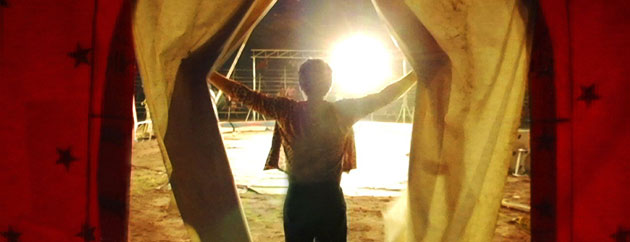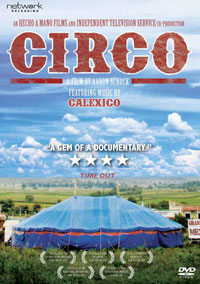
Life is a Circus – A Review of Circo
06 October, 2011The circus is tough, but it is also beautiful. So says ringmaster Juventino “Tino” Ponce at the beginning of Circo, a mesmerising documentary about a 100 year-old travelling circus in Mexico, struggling to prevent its own extinction.
Director Aaron Schock travels alongside the Ponce family as they lead their circus – the Circo Mexico – through the rural villages of Mexico. With his photographer’s eye for detail (he is also the cinematographer of the film) his images reveal what life is really like on the road for this family as they move from place to place, hauling trailers through muddy roads, pitching and striking the circus tent, feeding the tigers and lions and endlessly practising handstands, back-flips, juggling routines and contortions.
Circo is reminiscent of another recent life-on-the road documentary from Latin America, The Peddler (El Ambulante). But whereas in that film the protagonist, Daniel Burmeister, travels through Argentina alone, spending short periods with each of the communities he visits in order to create his films, in Circo the family is travelling constantly, never staying in one place longer than a couple of days and, except for some brief encounters between the eldest son Cascaritas and the local girls, keeping mainly to themselves.
The circus has been the Ponce way of life for seven generations. Tino Ponce began performing at the age of 6, when he was taught to scramble up a seven-metre pole as his father balanced it on his forehead. Now the ringmaster, Tito runs the circus, which is still owned by his father, but his younger brother, as well as his wife Ivonne and their four children all work with him. The work is hard, and relentless. Tino never complains, accepting his filial obligations and taking on the success of the circus as his own responsibility, even as dwindling audiences and mounting debts make the task ever more difficult. His wife Ivonne, however, sees things differently. She resents the devotion Tino has for the circus, and feels their children are being exploited. Parents are there to give their children everything, she says, not the other way around.
None of the four Ponce children have had much education. In the villages they visit, they look at the other children, watching them play and seeing them go to school, and compared to their own hard-working lives, it seems to them that those village children don’t do anything. They view themselves as employees of the circus, yet Tino insists that when the curtain goes up and the show begins, they are artists. Whatever the definition, the reality of these children’s lives is that they are being conditioned into a completely unique and unconventional type of existence, something far removed from normal everyday life. As the circus travels deeper into Mexico, so the conflicts between Tino´s traditional views of the circus life and the more modern attitudes of his wife and children also deepen until something has to give.
Circo is a unique and absorbing film. Not only because of the bitter-sweet beauty of its images: an orange sun, dipping slowly behind the circus tent; the oldest girl Alexia blowing into the faces of tigers through the bars of their cage as they purr contentedly; the trail of pretty broken-hearted Mexican girls left by her brother Cascaritas or their baby cousin Naydelin crying as her grandparents make her practice her back-flip over and over again. The film, made by an American, also presents a totally different perspective on the Mexican experience and way of life, As Schock himself said in an interview with Indiewire earlier this year when talking about what inspired him to make the film, that Circo was born out of a “desire to reverse the direction of the documentary lens that has typically looked at Mexico only from the border up and singularly through the subject of immigration. Instead, I wanted to go deep into the Mexican countryside and find a story that could communicate both the richness and the complexities of a vast culture and social order unfamiliar to most Americans.”
 Circo does just that but it goes further, raising questions about the nature of obligation and family, and asking if an unconventional upbringing, with the freedom and autonomy it provides, however modest, is better than a “settled” way of life. At the heart of the issues it raises it also looks at the inevitable allure of being an artist. It is interesting that both of Tino´s sisters, who are now married, still return to the circus from time to time to perform their acts. One of their daughters, Naydelin, also prefers the life of the circus to staying at home with her mother. One of the most memorable moments of the film is when all of the circus children are playing together in the middle a forest of white-washed trees: el show, el show they shout to one another, then Alexia and Cascaritas link hands, flipping each other over and over in one long fluid motion, while the others look on shy and admiring. Even at play, they are drawn to the glamour they have learnt underneath the tent: the magic of the circus is never far away.
Circo does just that but it goes further, raising questions about the nature of obligation and family, and asking if an unconventional upbringing, with the freedom and autonomy it provides, however modest, is better than a “settled” way of life. At the heart of the issues it raises it also looks at the inevitable allure of being an artist. It is interesting that both of Tino´s sisters, who are now married, still return to the circus from time to time to perform their acts. One of their daughters, Naydelin, also prefers the life of the circus to staying at home with her mother. One of the most memorable moments of the film is when all of the circus children are playing together in the middle a forest of white-washed trees: el show, el show they shout to one another, then Alexia and Cascaritas link hands, flipping each other over and over in one long fluid motion, while the others look on shy and admiring. Even at play, they are drawn to the glamour they have learnt underneath the tent: the magic of the circus is never far away.
Circo was released on DVD in the UK on September 12th by Network Releasing and in the US on September 20th by First Run Features. You can buy the DVD from Amazon (UK) and Amazon (US), or from Network Releasing’s website in the UK.
http://www.youtube.com/watch?v=1hCAJjtTJ2I
Follow Sounds and Colours: Facebook / Twitter / Instagram / Mixcloud / Soundcloud / Bandcamp
Subscribe to the Sounds and Colours Newsletter for regular updates, news and competitions bringing the best of Latin American culture direct to your Inbox.

